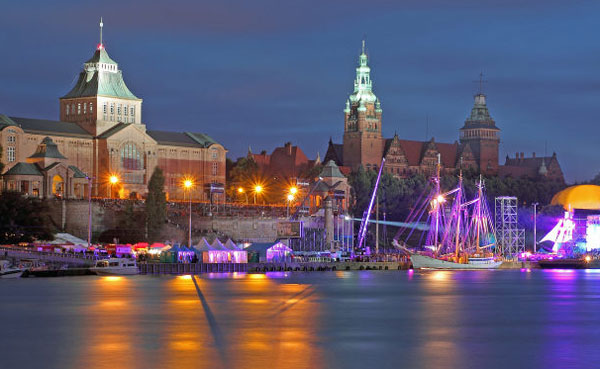Amazing Facts » Facts About Poland, A Country Of Resources And Education

Amazing Facts about Poland
Poland is a country, where the climate is good, educational resources are excellent. In addition, it also has a good climate and an extremely low crime rate.
Poland is the size of New Mexico, and is situated in north-central Europe. Poland's land mass is roughly square in shape, which measures 400 to 440 miles across. In fact, it is about 312,255 square kilometers, which makes it a bit smaller than New Mexico.
Most of the country is a plain with no natural boundaries, except the Carpathian Mountains in the south and the Neisse and Oder rivers in the western side. Other major rivers are the Vistula, Bug and Warta. Rysy is the highest mountain peak, which is about 8200 feet above sea level.
Poland’s formal name is Republic of Poland, or better known in Slavic as Rzeczpospolita Polska.
Poland has a climate that can be divided in to frosty winters and warm summers. Poland is in the Central European time zone, and which is one hour ahead of GMT in the winter months and two hours ahead of GMT from April to October.
The number of inhabitants in Poland, as of January 2016 is around 38.4 million. About 43 urban areas have a populace of more than 100,000 occupants. Warsaw, the capital and Poland's biggest metropolis, has a populace of about 1.7 million individuals.
A large number of Poles are mainly Roman Catholic. This is closely followed by people from the Polish Orthodox Church and various Protestant denominations. The country also has a small number of Muslims and Jews.
Poland has significant mineral and agrarian assets. It has the world's fifth biggest resources of hard and chestnut coal. In addition, it has as large resources of copper, lead, sulphur, zinc, silver, magnesium and rock salt. These contribute a large amount of Poland’s income. There are also other resources that include chalk, muds, characteristic gas, potash and kaolin.
The principle horticultural yields are wheat and different grains, potatoes, sugar beet and feed crops. The domestic resources are about 8 million meat and dairy steers and about 19 million pigs. While the agricultural area is about 18.7 million hectares, the forest area is about 8.9 million hectares, which provide a large amount of timber, an imperative asset.
Poland is a parliamentary republic with a leader and a Council of Ministers. The President is the head of state and is chosen at regular intervals in a mainstream decision. The Parliament is bicameral and comprises of a 460-part Sejm (the lower house) and a 100-part Senate. Elections happen at regular intervals. Sejm is chosen under d'Hondt corresponding representation strategy, with five percent decision limit, and Senat under majority voting framework with two to four Senators chosen from every voting public. There are four noteworthy gatherings spoken to in the Parliament; direct conservative Civic Platform, conservative Law and Justice, moderate Polish People's Party and social majority rule Left and Democrats.
Since the last 15 years, Polish GDP has steadily increased every year. The inflation rate is low and the wages are increased in a yearly rate of 15% for as long as two years. The unemployment, which was high until 2004, is quickly diminishing. Currently, the unemployment rate is 11 %, and is predicted to fall below 8% in the next two years. These practical elements, with modest living costs, make Poland an attractive place for both living and working.
In Polish urban communities, it is relatively easy for an understudy to find part-time work. The wages increase periodically and a large number of Polish understudies pick paid studies and begin working. This is despite the fact that the consent to work in Poland relies on upon your nation of origin.
In case you are a national of Belarus, Georgia, Moldova, Russia or Ukraine, you might work in Poland without a work license for six months, in a period no more than 12 months. Statement of job must be enlisted by the business at the neighbourhood work focus.
Studies in Poland cost anywhere around 2,000 to 5,000 Euros yearly. However, it is important to look at your preferred cost of the course, as it might be higher, and depends on the college choice. Grants are accessible for understudies with demonstrated Polish root. For graduate understudies the sum is 850 PLN, for postgraduate understudies 1270 PLN a month. All understudies from Belarus who are liable to political suppression might take an interest in Kalinowski Scholarship Fund, offering 1270 PLN a month. The grant application must be presented on nearby Polish department before coming to Poland. Shine departments give all the essential data.
People from different countries must purchase the business protection plan that takes care of the medicinal services costs in their nations, or pay for a deliberate strategy in Polish National Healthcare Fund.
Despite the fact that the Roman Catholic Church is the predominant religious establishment in Poland, one can also practice other religions. Although in the past, Poland had a background marked by religious intolerance, currently, any disrespect on religious premise are extremely uncommon and unheard of. Universal, Greek Catholic and protestant places of worship are available in most metropolitan cities. Muslim, Jewish Kehillas are also accessible in certain urban areas. In addition to above, there are also numerous different religious social orders who practice their religions.
The crime rate in Poland is much lower than in EU nations and much lower than the United States. This applies to most sorts of crime, including murders, assaults, burglaries and auto robbery. Nevertheless, the security levels are high, and one ought to abstain from strolling around evening time in any unsafe areas. Travellers are also advised to take care of their individual possessions. People are also warned to lock their houses, bikes, and cars, particularly those who live in the metropolitan cities.
Few of the world famous Poles are Arthur Rubinstein, Fryderyk Chopin, the greatest Polish composer, Marie Curie, the famous Polish physicist and chemist and the first twice-honoured Nobel Prize winner.
Image courtesy: skyscrapercity.com
Was this article useful? What should we do to improve your experience? Share your valued feedback and suggestions!
Help us to serve you better. Donate Now!
